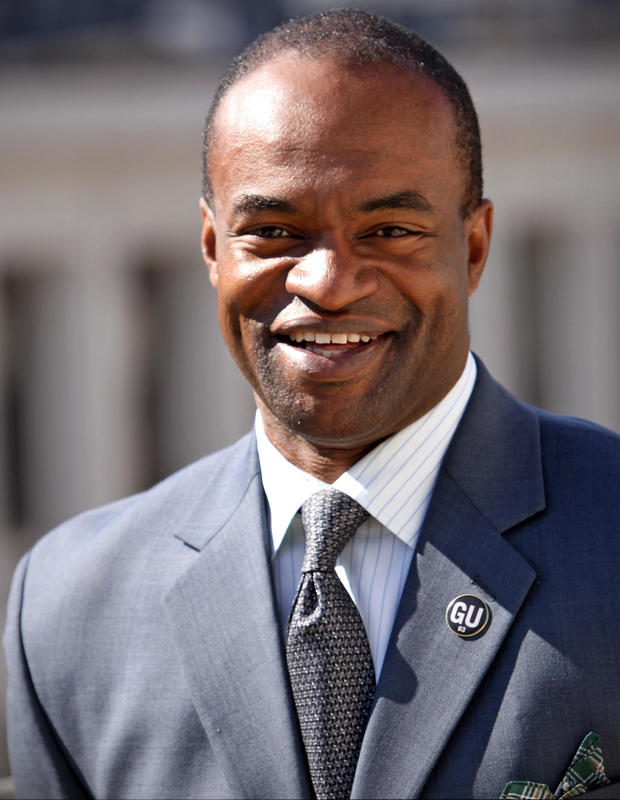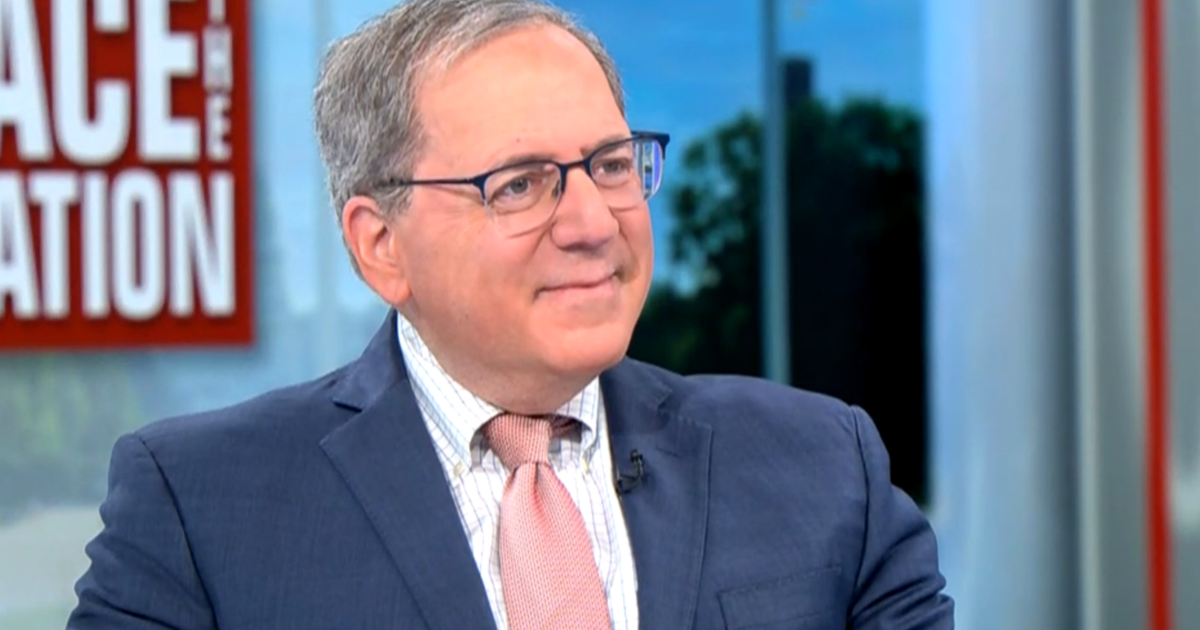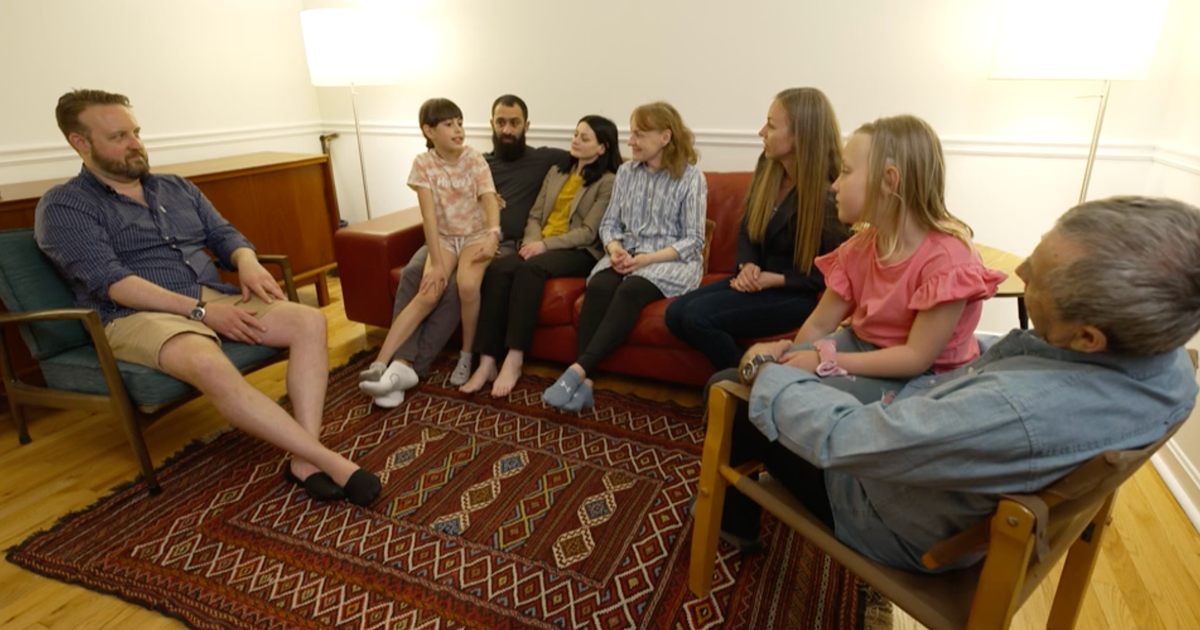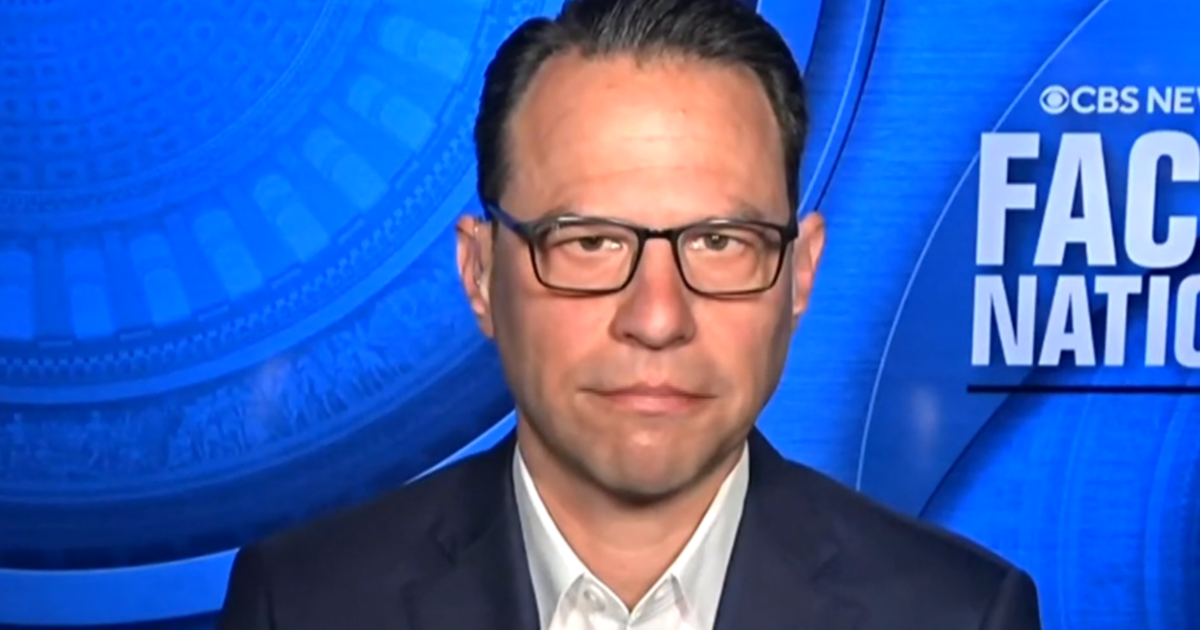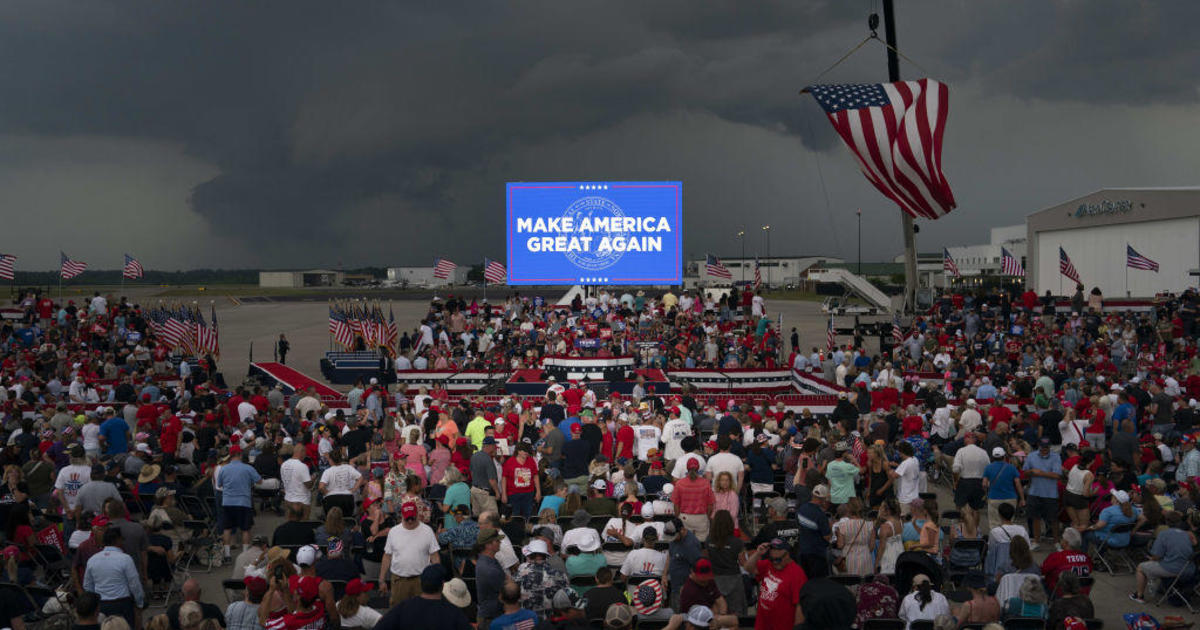NFLPA's DeMaurice Smith on NFL's leadership in fighting COVID-19 on and off the field
In this episode of Facing Forward, Margaret Brennan talks with DeMaurice Smith, NFL Players' Association (NFLPA) Executive Director on navigating a health crisis with one the world's most-watched sports events. After a season of strict COVID protocols and scheduling adjustments, what were some of the lessons the league learned to make it to Super Bowl Sunday COVID-free?
Download, rate and subscribe here: Apple Podcasts, Spotify and Stitcher
Highlights
On the NFL being a leader in testing, fighting COVID-19 with no national strategy: "It really became a challenge of- given sort of the overall lack of leadership that we had in the country, can we come up with a leadership model that relied on science to guide our way through this? And, you know, very quickly, we realized that if we tested- mass tested, if we had a robust contact tracing program, if we could convince our guys to wear a mask, change football to- to improve social distancing, that we could actually suppress the spread of the virus. And honestly, the thing I'm most happy about is not only did we make it, I think it provided a great blueprint of how the rest of the country can have businesses come back."
On spreading awareness and fighting mistrust in COVID vaccines: "What I care about right now is doing anything we can in the National Football League to promote getting the vaccine...I know that there's a level of mistrust out there about the vaccine. But I do think that we are at a point in our country where it simply takes all of us to keep our country safe. And we'll address the issue of vaccines with the National Football League during the off season. But let's put it this way. No professional athletes should be jumping the line to- to get the vaccine. I certainly don't believe in that."
On the NFL's lack of diversity in executive and team ranks: "We have a league that's where 70% of the people on the field look one way. And when you look at head coaches, coaches, NFL team front offices, NFL League front offices and the ownership ranks, it doesn't look anything like the people who are actually doing the work. And I think that that has long been a problem in the National Football League."
"Facing Forward": Eli Lilly's David Ricks transcript
Producers: Richard Escobedo, Kelsey Micklas, Anne Hsu
MARGARET BRENNAN: I'M MARGARET BRENNAN, AND THIS IS FACING FORWARD. THIS WEEK - SUPER BOWL 55.
*SOUND ON TAPE*
THE KANSAS CITY CHIEFS FACE OFF WITH THE TAMPA BAY BUCCANEERS… CAPPING OFF A SEASON WITH OBSTACLES THROUGHOUT.
*SOUND ON TAPE*
AFTER A SEASON OF STRICT COVID PROTOCOLS AND SCHEDULING ADJUSTMENTS, WHAT WERE SOME OF THE LESSONS LEARNED?
WHAT DOES IT TAKE TO KEEP A MULTI-BILLION-DOLLAR BUSINESS AFLOAT DURING A PANDEMIC?
WE'LL GET ANSWERS FROM DEMAURICE SMITH, EXECUTIVE DIRECTOR OF THE NFL PLAYERS ASSOCIATION. STAY WITH US - WE'LL BE BACK AFTER A QUICK BREAK.
*COMMERCIAL BREAK*
MARGARET BRENNAN: DeMaurice, it's so great to have you here with us ahead of the big game and what is a very, very big business that has found a way to manage through this pandemic. Which is pretty- pretty impressive that we're actually having a Super Bowl this year.
EXECUTIVE DIRECTOR OF THE NATIONAL FOOTBALL LEAGUE PLAYERS ASSOCIATION DEMAURICE SMITH : It's- let's just put it this way, it's been a- a long, probably the longest season I've ever had in my life, regardless of anything I've ever done. But, you know, things are- are- are good. They're looking good. But we've taken the approach all year that operating this business in a pandemic is a week to week, day to day enterprise. And we're only a few days away, and I'm not willing to allow- allow myself to relax. So, a couple of days and we'll have a great game with two great teams and something that's great for America.
MARGARET BRENNAN: So, I have to say up front that I am not a football fan. I am not a football aficionado, which I have to say as disclaimer, because that will become abundantly clear to our listeners very quickly. But I am someone who really appreciates the sheer scale in numbers. And reading through everything that you have been able to do is what makes me fascinated that- that in the midst of this pandemic, that we're having a season, that we're having a Super Bowl. And when you roll back the clock and you look at the timeline, the first COVID related shutdowns we saw in this country, they didn't come from the government, they came from the private sector, and it was--
SMITH: Right.
MARGARET BRENNAN: --the sports world that really led the way in some of these cases. With you know, the NBA nixing its season midway through. And it really wasn't clear that we were going to have any season possible. So, what did you have to do? Where did you begin in- in representing the players to be able to get them safely to this point?
SMITH: Well, going back in- in March, we had just finished a bruising collective bargaining round with the league. We got a deal done with the league, a new 11-year deal. I think the first week in March, we were all in Miami, Florida- the player leadership. And Broward County told us that they might shut down the- I'm sorry, that they were going to declare a State of Emergency. And the first thing I did, I bought the John Barry book on the 1918 Influenza. I downloaded it on my Kindle--
MARGARET BRENNAN: That is the book.
SMITH: That is the book. And we finished the vote, I think on a Sunday morning. I finished the book by Monday afternoon, and I was terrified the entire time. But reading that book was really the first step, and looking up and seeing March Madness shut down. The NBA had shut down. Baseball had shut down. The big takeaway that I had from the John Barry book was whether we should be playing in a pandemic, just sort of the moral issue. But, yeah, once you realize that there's probably not going to be a vaccine in three months and this- this virus was not going to just disappear into thin air, it really became a Herculean task.
MARGARET BRENNAN: And I mean, we're not just talking about well compensated players, we're talking about the knock on effect for people --
SMITH: Yeah.
MARGARET BRENNAN: --who sell popcorn in stadiums. I mean, there is just such a- a wave of impact that comes off of having a season or not having a season at all. And--
SMITH: Absolutely.
MARGARET BRENNAN: --and I mean, that's huge. That's a huge economic hit. So how did you make that judgment? You said you had to decide whether it was worth it to play at all. How did you decide it was worth it to- to put people at risk?
SMITH: Right. It was- it wasn't so much a worth question. It- it was a moral question. In March or April, May, we didn't know the airborne capabilities of this virus. We didn't know whether there was going to be long term consequences. So, the moral question was one about whether playing NFL football would unduly pose a risk to the community. And- and whether we would be in a world where somehow we were taking resources away from the country, because I was concerned that if we couldn't ensure that we weren't spreading the virus to the community or we weren't overtaxing our health provider system. You know, I would have made the decision and recommended to our players that we not play football. The second one though, is- is- it is a big business, not only for the players, but- but for everyone. You know, if you think about a football field and you draw a concentric circle around the field, you know it doesn't take you long before you get to the folks who are- are working in the stands, the people who are providing the- the seats, the stadium, and then outside of that, the first responders who are working our games. And then outside of that, the travel industry, the hotel industry that- that's hosting the players. And then outside of that, you know, a whole group of people who are impacted by our business. And, you know, very quickly, we realized that if we- if we- we tested- mass tested, if we had a robust contact tracing program, if we could convince our guys to wear a mask, change football to- to improve social distancing, that- that we could actually suppress the spread of the virus. And honestly, the thing I'm most happy about is not only did we make it, I- I think it provided a great blueprint of- of how the rest of the country can have businesses come back.
MARGARET BRENNAN: Right.
SMITH: It's not easy. And again, knock on wood, we only have one more game, but we haven't had one in-game transmission of COVID-19, which is interesting. Right? But- but we have had transmissions, you know, away from the field and at home. We've never had a positivity rate over 1%. And I'm proud of that- proud of our guys.
MARGARET BRENNAN: So, the NFL says 262 players tested positive, 463 personnel tested positive. You're saying that didn't happen on the field that happened at home. How has it affected the sport though?
SMITH: Well, it- it has affected the sport. And- and you and I are in the same boat. I'm not exactly a football head. The- the players elected me because I think, because I was a lawyer. I think.
MARGARET BRENNAN: Because you went to UVA law clearly--
SMITH: Well there you go.
MARGARET BRENNAN: One of the best law schools in the country. Wahoowa.
SMITH: There you go. Well, now, I, you know I went there. My wife went to UVA, and now my son plays lacrosse at Maryland. So we've- we've completely switched our allegiances away from Wahoowa to Terps. But, you know, I- I think that the way in which we learned about the transmission of the virus was- was exactly- and- and validated the ways that most medical scientists told us that the virus is going to be transmitted. Close contact between people in an environment that's not necessarily well ventilated, or- or transmitted through- through hand to eye, hand to mouth. Those were the things that we found out after a year of football. And- and certainly anyone who tested positive, we viewed as a- as a failure of our system. But, to go through an entire season to make it on the eve of the Super Bowl and- and have a positivity rate that most jurisdictions would- would literally, you know, dream of has been a really a success of- of the folks at the league, a success by the players. But I really champion the success for- for science. And at a time when it seems that people were doubting the folks who have spent their lives keeping us healthy, I'm really proud of the fact that we followed their advice.
MARGARET BRENNAN: Well, I mean, you ended up- the Players Association, the NFL ended up combining forces with the CDC on this research paper, I think you were just referring to--
SMITH: Yeah.
MARGARET BRENNAN: --that shows how to improve safety. So, I mean, the NFL is the richest league in the country. You represent the players. You had the resources, you had the initiative to- an incentive here to invest in figuring this out. What did you learn? Like what was usable for the rest of the country?
SMITH: You know, I think two broad frames. One, we learned that leadership matters. Early on in this, March, April, May, you probably know that we've had a few dust ups with- with the National Football League over the last 12 years, a lot of dust ups over the last 60 years. You know, at the beginning, we didn't agree on daily testing. The players believed that we needed to test every day. We- we didn't believe that we should really have a robust offseason workouts. And the players didn't believe that it was smart for us to have a regular preseason schedule. The league didn't agree with those three things initially. So really, the first battle was over leadership, and- and the--
MARGARET BRENNAN: Those are the exhibition games before the season.
SMITH: Correct, correct. So, you know, we have a collective bargaining agreement. I'm proud of the fact that- that we're a strong union. So we had a short term battle over those three things. The- the league agreed our way. The second thing about resources, yes, we- we're blessed in the National Football League. But what we wanted to force the league to do is to say simply you, the employer, have an obligation to provide a safe workplace or a workplace that's as safe as possible. If the cost of daily testing is what's necessary in order to put on this game, then that's the cost that the employer should bear.
MARGARET BRENNAN: So this wasn't perfect. Let-let's be honest. Some of the some players were cavalier about the restrictions. The league's COVID plan had to change like a month into the season. There were video surveillance systems put in to track whether players were wearing masks and keeping their distance. I mean, what was behind that? Why- why was it necessary to put in these monitoring systems?
SMITH: Once we answered the question of should we play, morally should we play, and then we came up with protocols that we wanted not only the coaches to abide by and team personnel to abide by, but the leadership made a decision that all players were going to abide by that. It's a short step then to say that the players also agreed to monitoring systems and in- in some cases video cameras in-in common areas of the training facilities in order to ensure compliance. Every person who was in Tier 1 wore a- a contact tracer, a little- a little plastic box that measured everybody that you came into contact with that day and the amount of time that you spent and the proximity that you had. The players made a decision that- that since we were going to engage in this effort to play and- and as a group of workers, we had come up with what we thought could work as- as a union. I'm proud of the fact that they also included compliance. And- and to your point, it wasn't perfect. We- we had Denver, I- I think, play without a number of quarterbacks. We had some teams play with only one running back. The Cleveland Browns this year played a playoff game without a coach.
MARGARET BRENNAN: Why were some of these folks not taking it seriously or was it just too much?
SMITH: I- I think that what we saw in the National Football League were a microcosm of the country. You had some people who continued to think that they were somehow immune to COVID. You had some people who believed that it was better just to get it. You had some people who just simply did not want to engage in the rigor or the discipline. The good news is I'm glad that for the most part, that was a incredibly small number of people in the National Football League who- who flouted the rules. But I will say, and again we agreed with it with the National Football League, when there was evidence that- that people were willingly disobeying the-the compliance measures, hefty fines were- were doled out to coaches and teams. And I think that was necessary. And it's probably one of the things that led us to- to where we are today.
MARGARET BRENNAN: Are you going to ask the league to mandate vaccinations of players?
SMITH: That's a question that, again, is collectively bargained. We have some time--
MARGARET BRENNAN: Are you looking at it?
SMITH: Oh, absolutely. It'll be an issue that's ultimately influenced by collectively bargained. What I care about right now is doing anything we can in the National Football League to promote getting the vaccine. My parents are in their 90s. They got the vaccine the other day. I know that there's a level of mistrust out there about the vaccine. But- but I do think that we are at a point in our country where it simply takes all of us to- to- to keep our country safe. And we'll- we'll address the issue of vaccines with the National Football League during the off season. But- but let's put it this way. No- no professional athletes should be jumping the line to- to get the vaccine. I certainly don't believe in that.
MARGARET BRENNAN: But you do have a lot of influencers, obviously--
SMITH: Yep.
MARGARET BRENNAN: --people who have huge followings. Will we see NFL players out there doing public service announcements saying go out and get your shot in the arm?
SMITH: I-I expect to see that. And- and only because well, not because I've had any specific conversations with players about doing that. But this entire season, we-we've seen players step up to the plate on social justice issues, equality issues, police brutality issues, issues of democracy. So the fact that our- our- our men and their families have stepped up to the plate to- to be a part of their community, I- I would be surprised if we wouldn't have players doing exactly the same thing when it comes to beating COVID and getting the vaccine.
MARGARET BRENNAN: Alright, DeMaurice, stay with us. We're going to take a quick break here.
*COMMERCIAL BREAK*
MARGARET BRENNAN: So there are two Kansas City Chiefs players who came in contact with a barber, apparently who tested positive. Do you know what the- the latest is? Will they be able to play in Sunday's game?
SMITH: They are currently in the high risk, close contact protocol. So they're being tested, diligently tested, and- and isolated away from the rest of the team. Once we get the final round of tests from them Friday and Saturday, we'll know whether they'll be playing in the game.
MARGARET BRENNAN: So you talked about this a little bit earlier, but the sport itself has gotten political and it's gotten politicized in the past few years. It's on everyone's radar now. And activism among the players has brought, you know, praise and controversy to the NFL. Where are we now with the league accepting that activism from players?
SMITH: Yeah. Well, it's been a journey, I think. I have always been one who wanted to, you know, exhort our players to not view themselves as somehow, you know, disconnected or- or isolated from their community. You know, players came out of the tunnel in St. Louis several years ago after the riots and- and shooting in Ferguson. We had players protest the Vietnam War back in the '60s and '70s. Sport, I would argue, has always had an element of politics in it. And I know that the flip side of the argument that I've- I've heard, let's just say, more than once from almost everybody who just wants to come up to me and give me their opinion, that sports should be an escape for people. And that Sunday should be something where people come together without controversy. I've always kind of responded to those things simply by saying, you know, when in our country have we simply been at our best when we tried to escape the things that everyday people have to deal with? I- I don't necessarily see sports as being over-politicized or under-politicized. I see it as a reflection of the country. And- and I think that the- the fact that the NFL has done a better job of embracing the authenticity of our players over the last few years, I actually think it's been great for the sport, but also the moral and right thing to do.
MARGARET BRENNAN: So I know one issue that's being talked about these days is the lack of minority representation among coaches. Black NFL players make up 70% of the league, but the coaching numbers are far, far less than that. What impact does hiring minority coaches have on opportunities for players? Is there a direct connection?
SMITH: Yeah, well, I think the direct connection is we have a league that's- that's where 70% of the people on the field look one way. And when you look at head coaches, coaches, NFL team front offices, NFL League front offices and the ownership ranks, it doesn't look anything like the people who are actually doing the work. And I think that that has long been a problem in the National Football League. I think that, unfortunately, we've- we've had some former coaches of color who I think have given excuses or cover for the league in this. And not all of them, but some- certainly some of them have. There are some organizations out there who have given cover and provided excuses to the league. The league did ask the NFLPA to assist them on improving diversity. And- and we're going to have those conversations with the league during the off season.
MARGARET BRENNAN: Do you think in the next five to 10 years we'll see women actually playing in the NFL?
SMITH: I- I hope so. You know, this year you didn't have to be a football fan to- to cheer for the young woman who came off the sidelines to kick a field goal for her college team. I-I thought that was fantastic. I think that having people who can play at this level- it-it-it- we should be open about all of that. But I really care about improving the transparency and accountability on- on hiring not only across the coaching ranks, but hiring in team front offices. You know, there- there are a ton of people who work in football, accountants, lawyers, actuaries, people- people who run their communications departments. Those- those offices should reflect the diversity of our country and the diversity of the people on the field.
MARGARET BRENNAN: You mentioned- you're a parent. I'm a parent. Obviously you're concerned about the well-being of- of your child, and you have the job of protecting other people's children right now. The league says on concussions they are down about five percent this season. We know the Chief Medical Officer at the NFL was recently asked about concussions. And I want to play for you what he said about when it's safe for a player to return to the field.
*SOUND ON TAPE*
NFL CHIEF MEDICAL OFFICER ALLEN SILLS: The whole goal of the return to play process is, is the brain fully healed? We have to understand that we don't have a blood test or a scan that that tells us that right now, our best way to assess as clinicians if the brain is healed is do we see symptoms reemerge as someone ramps up that activity. And so that's why we haven't put a particular time stamp on it, is because people do recover at different rates.
MARGARET BRENNAN: So he's basically saying it's a case by case basis here, but in your view, does the concussion protocol need to be revisited? Should there be a mandatory minimum number of days a player is kept off the field for his own safety?
SMITH: I- I don't think so. I mean, you know, taking us back to 2009, 2010, the NFL Players Association and the players themselves wrote the first concussion protocols. We didn't have them in the National Football League until the players made a decision that they were going to write these protocols. And the players insisted on sideline concussion experts and the players insisted on a return to play protocol. The core of that protocol has always been, we're going to follow the science. So right now, most, if not all of our neuroscientists don't believe that there is a mandatory minimum number of days away. I have a tremendous amount of comfort on how we're handling concussions in the National Football League, primarily because they are collectively bargained by- by the union. Where I am concerned, for example, is a recent report analyzing college football that demonstrated that most of their concussions in college football are coming from practices, not games. And we in the National Football League inherit players who are coming through a college system where for some reason their doctors and physicians and coaches and- and NCAA leaders feel that it's okay to have more people suffer concussions in practice than in the game. For some reason, the medical science that we're relying on here is medical science that the NCAA refuses to rely on. And- and that's a failure of leadership.
MARGARET BRENNAN: Last question, you went to UVA Law School, as I mentioned--
SMITH: Yep. Yep.
MARGARET BRENNAN: --and before you joined the Players Association, you actually worked at the Justice Department for a bit--
SMITH: I did.
MARGARET BRENNAN: --then private practice. For all those law school students suffering through their exams, who are wondering how do I get a cool job like yours how did- how did all of that prep you for working with football players?
SMITH: You know, I think what prepares you the most is- is being curious. You know, being a trial lawyer, you- you have to learn the facts very, very quickly. You have to be able to look around corners. You have to be able to engage in the- the mental rigor of building a narrative and- and figuring out exactly what's going on. So I- I think if I had to look at one trait that was developed there, it was that. Certainly collective bargaining is about advocacy. But as far- as- as far as dealing with 2,500 players in the National Football League, I'm not sure anything quite prepares you for that.
MARGARET BRENNAN: Well, thank you DeMaurice.
